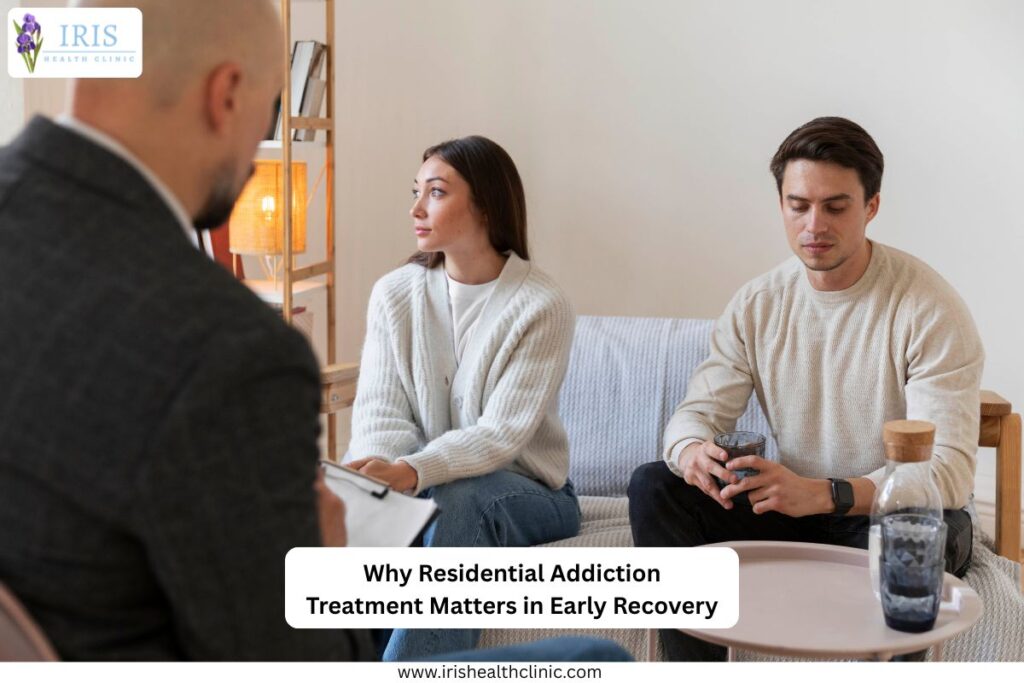One of the most important moments in addiction recovery is the early recovery period. In this phase of recovery, emotional and physical setbacks feel overwhelming, psychological challenges really bother one, and if without support, the chance of relapse is high. Residential addiction treatment, along with sustaining a safe environment and structure, are the very bases needed to realize long-term recovery.
At Iris Health Clinic, we view recovery as a process beyond mere cessation of substance use-it includes building lives with professional care and by being supported by a caring team.
Why Residential Treatment for Addiction Is Important in Early Recovery
- Support and supervision go on 24 hours.
- An individual in early recovery could feel withdrawal symptoms, when cravings or even emotions could overwhelm them.
- Such residential treatment programs provide an array of medical and mental health professionals around the clock.
- This constant support will minimize the risk of relapse during the most vulnerable time of the recovery process.
- Provides a structured environment as an aid for healing.
- Routines can help many individuals eliminate chaos and triggers in their lives.
- All the therapy, group meetings, and wellness and recreational activities keep individuals engaged and focused on recovery, rather than wonder what they will do next to fill the time.
- A structured and trustworthy environment will also help support disciplined behavior and consistency.
- Addresses any mental health concerns.
- Most individuals entering recovery have some combination of depression, anxiety, and/or trauma-related issues.
- Dual diagnoses treatment is considered in residential care to ensure the addiction and mental health concerns are treated at the same time.
- This holistic approach reduces relapse.
- Removes Negative Influences and Triggers
- In the early days of recovery, it can be hard – even dangerous – to stay situated in the same environment that allowed for the addiction to become ingrained.
- When you participate in a residential addiction treatment program, you are assisting yourself in removing yourself from toxic, negative relationships and triggering people and places.
- You give yourself space to start newly in a safe environment that is recovery-focused.

- Creates Long-Term Recovery Foundation
- Patients develop coping skills, relapse prevention skills and ways to live life healthily.
- Peer support from other patients who are in recovery promotes motivation and accountability.
- The skills learned in residential care create a foundation to be successful following treatment.
Quick Benefits:-
- Safe, sober environment
- Around-the-clock medical and emotional support
- Therapies customized to meet individual needs
- Supportive peers and community
- Resources to prevent relapse and maintain recovery long-term
Frequently Asked Questions
Q1. How long is residential addiction treatment? How long do I stay at a treatment center?
The length of stay at a treatment center is based on the individual and can vary from 30-90+ days. Many individuals need more time to process the trauma and grow or advance in their recovery journey.
Q2. Is residential treatment just for people with severe addiction?
Not really. While residential treatment is especially effective for severe addiction or those with multiple substance use disorders, many individual find addiction residential treatment helpful in their recovery, even if they are at a lower severity level and need an extra structure and support early on.
Q3. What therapies does residential treatment include?
Residential treatment often includes many different types of therapies, including individual counseling, group therapy, family therapy, cognitive-behavioral therapy (CBT), and holistic therapies such as yoga, meditation, and/or fitness therapy.
Q4. Can my family participate in treatment?
Definitely! Many centers have families entering treatment for therapy, educate families in various ways, or assist families with family support groups. Such programs allow the family members to work more closely on their relationships and construct a healthier atmosphere at home.
Q5. What happens when I leave residential treatment?
While in treatment, you will undergo the development of an aftercare plan consisting of outpatient therapy, support groups, relapse prevention strategies, follow-ups with the treatment center, etc., all to help you in the process of staying substance free!
Conclusion
Early recovery is like tightrope walking, where one false step leads to yet another relapse. This is exactly why we decided that the residential treatment program at Iris Health Clinic, which provides structure, care, and support, allows our patients to begin their recovery on the right foot immediately.
If you want to support someone you care about or yourself, you don’t have to fight addiction alone. If you have the right support system, your journey to a sober and healthy life can change entirely.

